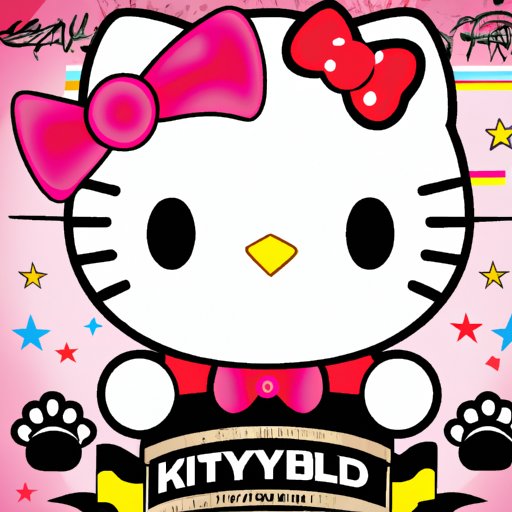What Year Was Hello Kitty Invented: A Comprehensive Exploration
Since its creation, Hello Kitty has become a global phenomenon, captivating millions of fans worldwide. The iconic character, known for her cute appearance and charm, has a fascinating history that dates back to the 1970s. Understanding the origins of Hello Kitty can help us appreciate her enduring popularity in today's culture. In this article, we will delve into the details of when Hello Kitty was invented and explore the story behind this beloved character.
Hello Kitty is much more than just a cartoon character; she represents a cultural icon that has transcended generations. From her humble beginnings to becoming a symbol of Japanese kawaii culture, Hello Kitty's journey is one of innovation, creativity, and global influence.
This article will provide an in-depth exploration of the invention of Hello Kitty, including the year she was created, the inspiration behind her design, and her impact on popular culture. Whether you're a long-time fan or simply curious about her origins, this article aims to answer all your questions.
Read also:Carl Grimes In The Walking Dead A Comprehensive Exploration
Table of Contents
- What Year Was Hello Kitty Invented?
- Biography of Hello Kitty
- Design Inspiration
- Who Created Hello Kitty?
- Rise in Popularity
- Global Influence
- Hello Kitty Products
- Collaborations and Partnerships
- Hello Kitty Statistics
- The Future of Hello Kitty
What Year Was Hello Kitty Invented?
Hello Kitty was officially invented in 1974. This was a pivotal moment in the history of Japanese pop culture, as it marked the debut of one of the most recognizable characters in the world. Sanrio, the company behind Hello Kitty, introduced her as part of their efforts to expand their product line with a focus on cute and approachable designs.
1974 was chosen as the launch year because Sanrio believed it was the perfect time to introduce a character that could appeal to both children and adults. The decision paid off, as Hello Kitty quickly gained popularity and became a household name within a few years.
Why Was 1974 Significant?
The year 1974 was significant not only because it marked the birth of Hello Kitty but also because it coincided with a growing interest in kawaii culture in Japan. This cultural movement emphasized cuteness and simplicity, making Hello Kitty an ideal representation of these values.
Besides, the timing allowed Hello Kitty to capitalize on the emerging global market for cute merchandise, setting the stage for her international success in the years to come.
Biography of Hello Kitty
Hello Kitty's biography is as fascinating as the character herself. Born on November 1, 1974, in London, England, Hello Kitty is portrayed as a cheerful and friendly character who loves making new friends. Below is a table summarizing some key details about Hello Kitty:
| Name | Hello Kitty |
|---|---|
| Birthdate | November 1, 1974 |
| Place of Origin | London, England |
| Species | White Cat |
| Hobbies | Traveling, eating delicious desserts, and making new friends |
Design Inspiration
The design of Hello Kitty was inspired by various elements, including traditional Japanese aesthetics and the growing popularity of cute characters in the 1970s. Her creator, Yuko Shimizu, aimed to create a character that would appeal to a wide audience while maintaining a simple and approachable design.
Read also:What Is The Score To The Steelers Game A Comprehensive Guide For Fans
Hello Kitty's most distinctive feature is her lack of a mouth, which was intentionally left out to allow fans to project their own emotions onto her. This design choice has contributed to her universal appeal and enduring popularity.
Key Features of Hello Kitty's Design
- Round face with simple lines
- Signature red bow on her left ear
- No mouth to encourage emotional interpretation
- White fur with soft, rounded edges
Who Created Hello Kitty?
Hello Kitty was created by Yuko Shimizu, an artist working for Sanrio at the time. Shimizu's vision for Hello Kitty was to create a character that embodied the essence of kawaii culture while also being versatile enough to appeal to people of all ages.
Under Shimizu's guidance, Hello Kitty evolved from a simple design concept into a global phenomenon. Her work on the character earned her widespread recognition and respect within the industry, cementing her place in the history of character design.
Yuko Shimizu's Contributions to Sanrio
Shimizu's contributions to Sanrio extended beyond Hello Kitty. She played a key role in developing several other characters for the company, helping to establish Sanrio as a leader in the character merchandise industry.
Rise in Popularity
After her debut in 1974, Hello Kitty's popularity grew rapidly, both in Japan and internationally. Her appeal lay in her universal design and the wide range of products featuring her image. From stationery to clothing, Hello Kitty merchandise quickly became a staple in many households.
By the 1980s, Hello Kitty had achieved global recognition, with fans in countries across the world. Her success was bolstered by strategic marketing campaigns and collaborations with major brands, further cementing her status as a cultural icon.
Factors Contributing to Hello Kitty's Success
- Universal design that appeals to diverse audiences
- Wide range of products catering to different interests
- Strategic partnerships with global brands
- Consistent branding and quality control
Global Influence
Hello Kitty's influence extends far beyond the world of character merchandise. She has become a symbol of Japanese culture and a representative of kawaii aesthetics on the global stage. Her impact can be seen in various industries, including fashion, entertainment, and even technology.
In recent years, Hello Kitty has also been involved in social causes, using her platform to raise awareness about important issues such as education and environmental conservation. This demonstrates her role not just as a commercial character but also as a positive force in society.
Hello Kitty and Social Responsibility
Sanrio has used Hello Kitty's popularity to promote various charitable initiatives, including partnerships with organizations focused on children's welfare and environmental sustainability. These efforts have helped enhance her image as a character that cares about the world around her.
Hello Kitty Products
The range of Hello Kitty products is vast and diverse, catering to fans of all ages and interests. From classic items like stationery and accessories to more contemporary offerings such as tech gadgets and home decor, Hello Kitty merchandise continues to evolve with the times.
Some of the most popular Hello Kitty products include:
- Stationery items like notebooks, pens, and erasers
- Fashion accessories such as bags, hats, and jewelry
- Home decor items like cushions, lamps, and wall art
- Electronic devices and accessories like phone cases and chargers
Collaborations and Partnerships
Hello Kitty's success can also be attributed to her numerous collaborations with major brands across various industries. These partnerships have helped expand her reach and introduce her to new audiences.
Some notable collaborations include partnerships with luxury fashion brands, tech companies, and even airlines. These collaborations have not only boosted Hello Kitty's visibility but have also demonstrated her versatility and adaptability to different markets.
Examples of Successful Collaborations
- Collaboration with Moschino for a high-end fashion line
- Partnership with Sanrio Puroland theme park for exclusive merchandise
- Team-up with airlines for Hello Kitty-themed flights and amenities
Hello Kitty Statistics
Hello Kitty's impact on the global market is reflected in various statistics that highlight her enduring popularity. According to Sanrio, Hello Kitty merchandise is sold in over 130 countries, with annual sales reaching billions of dollars.
Additionally, Hello Kitty has been recognized as one of the most valuable character brands in the world, consistently ranking among the top in global brand value assessments.
Key Statistics About Hello Kitty
- More than 50,000 products featuring Hello Kitty are available worldwide
- Hello Kitty merchandise is sold in over 130 countries
- Annual sales of Hello Kitty products exceed $8 billion
The Future of Hello Kitty
As Hello Kitty enters her fifth decade, her future looks as bright as ever. Sanrio continues to innovate and expand her brand, introducing new products and experiences that appeal to both long-time fans and new generations.
With ongoing collaborations, digital content, and new initiatives aimed at promoting social responsibility, Hello Kitty remains a relevant and influential figure in the world of pop culture. Her ability to adapt to changing trends while staying true to her core values ensures her continued success in the years to come.
Upcoming Projects and Initiatives
Sanrio has announced several upcoming projects for Hello Kitty, including new merchandise lines, digital content, and theme park expansions. These initiatives aim to enhance the Hello Kitty experience and keep her at the forefront of global pop culture.
Conclusion
Hello Kitty's invention in 1974 marked the beginning of a cultural phenomenon that continues to thrive today. From her humble beginnings as a simple character design to her status as a global icon, Hello Kitty's journey is one of creativity, innovation, and adaptability.
As we look to the future, it's clear that Hello Kitty's influence will only continue to grow. Her ability to connect with fans of all ages and backgrounds ensures her place as a beloved character for generations to come.
We invite you to share your thoughts and experiences with Hello Kitty in the comments below. Whether you're a long-time fan or new to her world, your feedback helps us understand the impact she has on people's lives. Don't forget to explore our other articles for more insights into the world of pop culture and beyond!


